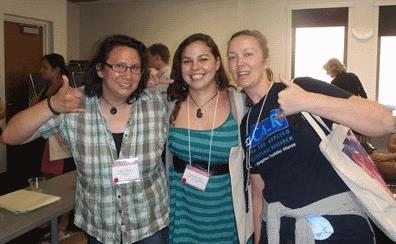Alumni profile: Katja Hanke
31 October, 2013

Q. What are you doing now?
A. I am a university lecturer (for cross-cultural psychology and its methods) at Jacobs University, Bremen International Graduate School of Social Sciences (BIGSSS), School of Humanities and Social Sciences (SHSS) in Bremen, Germany.
I am involved in undergraduate teaching and teach an introductory lecture in empirical research methods. I can’t wait to embark on teaching cross-cultural content.
I am also a Marie Curie fellow. I received a “Career Integration Grant” from the European Commission. The Marie Curie project, “Belongingness”, is looking at the host-migrant relationships in Germany from multiple angles. The second research project funded by the German-Israeli-Foundation (GIF), “Seventy Years Later: Historical Representations of the Holocaust and their effects on German-lsraeli Relations”, investigates how different representations of the Holocaust influences explicit and implicit motivations and attitudes of Germans and Israelis using experimental designs.
Besides these two main research projects, I have never lost touch with our CACR Alumni and I am collaborating on small scale projects with, for example, Melanie Vauclair and Diana Boer. Currently, a small research project is being developed in which many from CACR will be involved to some extent.
Q. Why did you choose to complete your PhD at CACR?
A. In my case, it started a little unusual. I was on a Working Holiday in New Zealand in 2005 with Diana Boer. During this time, Diana and I completed a research internship with Ron Fischer and James Liu at CACR. It had been the most interesting insight into research I’ve experienced, especially into cross-cultural research.
We were then asked whether we had thought about doing our PhDs at CACR. We did not have to think twice. CACR and its scholars had a very important impact on my passion for research and on my academic development. It has been the wisest and best choice that I have made.
CACR is a very stimulating environment with many world-known experts in cross-cultural psychology. From my point of view, CACR is a paradise for any PhD student pursuing intercultural and cross-cultural research, with a lot of intellectual exchange as well as social and moral support.
Q. How would you describe CACR to someone who hasn’t studied here?
A. CACR is an internationally recognized flagship of excellent cross-cultural research. It has a very good reputation and belongs to the few research centers throughout the world being acknowledged for the excellent theoretical and practical contributions to knowledge and to society.
The scholars at CACR are leading figures in their respective areas. This means there are a lot of experts covering a range of different topics across different parts of the world. This is also a reason that many international students are attracted to study there. This, of course, creates a truly multicultural environment.
CACR offers a very supportive and motivating atmosphere, giving space for academic and social exchange between supervisors and students.
Q. What would your advice be for new graduate students from CACR?
A. Dive into the cultural experience. Exchange with your fellow students and researchers – intellectually and socially. Build a good supervisor-student relationship.
As a PhD student you will face many doubts about yourself and your work. This is absolutely normal and unfortunately a part of the whole PhD experience. So I would advise people to never lose focus and faith in what you are doing, even though the road seems rocky and the goal of finishing seems far away.
There is a life outside the PhD as well. Balance is important. No one can always be productive. If you are feeling lost, then it is a good time to take a break, to do something nice with colleagues and friends, to distract yourself from the heavy work load ahead. By doing this, it is possible to go back to work with a clear head and new ideas.
I would also advise everyone who is pursuing a PhD to not take themselves too seriously. Laugh a lot and create good memories with colleagues and friends.
Q. Tell us about an obstacle you had to overcome. What did you learn?
A. The biggest challenge for me was learning how to make efficient use of my time - time management. I think especially at the end of my PhD, I learnt it when I was writing up my thesis.
Since I already had a plane ticket back to Germany, I had to finish my thesis within a very narrow time frame. I learnt how to effectively use my time and be very productive.
However, I only learnt how to be very efficient and productive under time pressure. I think how to manage one’s time is one of the biggest challenges during a PhD. This includes multiple other skills to master - planning, organizing and balancing between work and life. I learnt a little how to manage my time, but there is so much more to learn.
Q. What is your proudest achievement?
A. That is a difficult question. I was happy about finishing my PhD thesis and about getting recognition of my work. Usually, I am very excited and proud of my friends from our CACR PhD cohort. When they achieve something, I am extremely happy and proud of them. I still am when I see them succeeding in the academic world.
